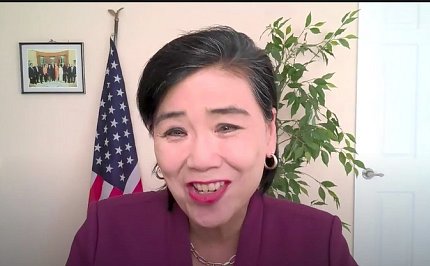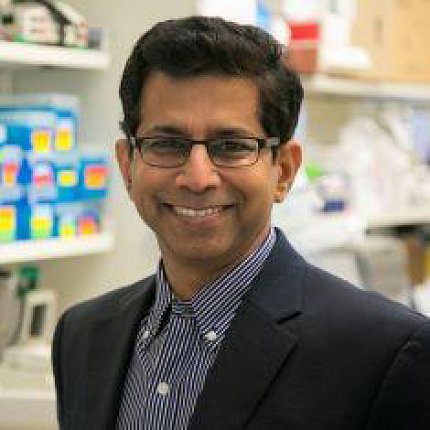Annual AANHPI Health Research Conference Marks Heritage Month

The NIH Asian American, Native Hawaiian and Pacific Islander Health Scientific Interest Group (AANHPI-HSIG) recently hosted the second annual AANHPI Health Research Conference virtually. More than 300 registrants joined the event to celebrate AANHPI heritage, highlight achievements both in research and of AANHPI scientists, and discuss health research needs in the community.
The two-day conference involved NIH-wide and HHS-wide planning and was sponsored by the National Cancer Institute (NCI). The event brought together some of the world’s leading scientific and regulatory experts in AA and NHPI research from government, academia and the community. For program details, visit https://events.cancer.gov/archive/2023-AANHPI-HSIG-Annual-Conference.
NCI’s Dr. Dan Xi, AANHPI-HSIG chair, opened the conference by acknowledging May as Heritage Month, outlining the event’s purpose and highlighting HSIG contributions (published in Cell & Bioscience, July 2022) to establishment of the first-ever National Strategy to Advance Equity, Justice and Opportunity for Asian American, Native Hawaiian and Pacific Islander Communities by the White House, which is the only NIH-led project.
Establishment by AANHPI-HSIG of an NIH honorary talk, “U.S. Representative Judy Chu AANHPI Mental Health Lecture,” was announced to acknowledge the first congressional resolution recognizing May 10 as AA and NHPI Mental Health Day. Chu, who represents California’s 28th district, introduced the resolution in 2021. She spoke during the conference via pre-recorded message.
Several speakers gave opening remarks, including Dr. Lawrence Tabak, acting NIH director; Dr. Eliseo Pérez-Stable, director of the National Institute of Minority Health and Health Disparities; Dr. Michael Chiang, director of the National Eye Institute; Dr. Noni Byrnes, director of the Center for Scientific Review; and Dr. Walter Koroshetz, director of the National Institute of Neurological Disorders and Stroke (NINDS).
Keynote addresses were presented by Dr. Rena D’Souza, director of the National Institute of Dental and Craniofacial Research, and Dr. Chau Trinh-Shevrin, a professor at New York University. They gave perspectives on health disparities and bias/racism. The morning session recording is archived at https://go.nih.gov/23u7z1c.

To celebrate the 80th anniversary of the Magnuson Act, which repealed the Chinese Exclusion Act, Xi collaborated with the Office of NIH History and Stetten Museum to highlight AANHPI scientists and staff who worked at NIH during the 1940s to 1960s. Dr. Emma Teng of MIT gave an overview of the history and the effect of the exclusion act and its repeal.
Research talks included one on cancer and one on Alzheimer’s disease and four scientific sessions.
Dr. Jin Qin of CDC’s Division of Cancer Prevention and Control described the unique distribution of cancers and disproportionately lower rates of cancer screening among Asian American and Pacific Islander populations and highlighted the importance of disaggregated data. Qin also discussed how to establish a sustainable infrastructure to promote cervical cancer screening and management in the U.S. Affiliated Pacific Islands.
A cancer genetic ancestry session included presentations by four experts in the field—Drs. Jian Carrot-Zhang of Memorial Sloan Kettering Cancer Center, Alexander Gusev of Harvard Medical School, Jun Yang of St. Jude Children’s Research Hospital and Elad Ziv of the University of California, San Francisco (UCSF).
Genetic ancestry can influence cancer risk and response to cancer therapies (such as immunotherapy and chemotherapy). The speakers collectively called for more investigations on the interactions of environment and social determinant factors with genetic ancestry. The need for international collaborations and study of larger cohorts across different subgroups of ethnic populations and across the country were discussed.

A session on pancreatic cancer featured four speakers—Dr. Channing Der of the University of North Carolina at Chapel Hill, Dr. Senthil Muthuswamy and Dr. Christine Alewine of NCI, and Dr. Wendy Setiawan of the University of Southern California. They covered diverse topics including new targeted therapies against the Ras oncogenic signaling pathway, the use of patient-derived tumor organoids for personalized medicine, the latest progress in antibody drug conjugates in pancreatic cancer clinical trials and new insights on risk and cancer health disparity for pancreatic cancer among different ethnic groups.
Presentations highlighted advances in understanding of pancreatic cancer from molecular details to population-level risks that will enable better and more equitable treatment in the future.
Day 2 started with Dr. Lisa McGuire, lead epidemiologist on CDC’s Alzheimer’s disease team, who provided an overview of the prevalence of Alzheimer’s Disease and its associated risk factors in the United States. McGuire closed with a call to action: dementia is a public health issue and there are effective interventions to protect brain health.
A session on cellular mechanisms of neurodegenerative diseases included four scientists.

Dr. Sara Banderes-Ciga of NINDS, Dr. Li-Huei Tsai of MIT, Dr. Li Gan of Cornell Medicine and Dr. Priyanka Narayan of the National Institute of Diabetes and Digestive and Kidney Diseases presented recent work on specific risk factors for Alzheimer’s disease and related dementias. Discussions provided not only a global view on the genetic architecture of Alzheimer’s and related etiology, but also detailed mechanisms on how certain risk factors influence human physiology specifically to cause neurodegeneration and dementia.
The risk factor and epidemiology session presented research on environmental, occupational and social factors and their impact on health outcomes in different AANHPI ethnic groups, such as Chinese, Korean and Vietnamese communities. The session emphasized the need for epidemiologic studies to address disparities in cancer outcomes and risk factors within AANHPI communities.
Dr. Thu Quach of Asian Health Services presented occupational exposures and related health outcomes among Vietnamese nail salon workers and her community-based intervention studies to improve their health. Dr. Iona Cheng of UCSF shared the effect of air pollution and neighborhood characteristics, e.g., racial and ethnic segregation, on cancer disparities in Japanese and Native Hawaiian individuals. Dr. Brittany Morey of UC-Irvine presented how stress and sleep disturbance affect self-reported health in Chinese and Korean immigrants.

Finally NCI’s Dr. Jongeun Rhee introduced how per- and polyfluoroalkyl substances, forever chemicals, are widespread in the blood of AANHPI individuals and affect kidney cancer risk among Japanese and Native Hawaiian individuals.
A community research and outreach session led by Drs. Adelaida Rosario of HHS’s Office of the Assistant Secretary of Health and Maria Paz Carlos of HRSA highlighted the importance of stimulating more research in the U.S. Pacific territories, recognizing that work outside of the U.S. mainland comes with particular needs and challenges and requires the highest level of cultural competency in every regard.
Va’a Tofaeono of the American Samoa Community Cancer Coalition presented on the NIMHD-funded INSPIRE program, noting that outcomes can be significant when capacity resources are supplied and interwoven with the indigenous cultural infrastructure.
Dr. Doan Singh of the Food and Drug Administration highlighted the commitment, efforts, and impacts of the U.S. Public Health Service Corps Asian Pacific American Officers Committee (APAOC) group on advancing health equity in the AANHPI community.
The conference continued to provide recommendations for the National Strategy and HHS Goal 5:
- Dismantle stereotypes and racism
- Pursue data disaggregation and data equity in health disparity research from disease incidence, therapeutic response to survivorship
- Understand biological mechanisms of genetic ancestry and its interaction with environmental, occupational and social determinant factors
- Continue community engagement and community-led research
- Continue culturally competent workforce development
- Increase leadership opportunities and international collaboration.
Recordings from the conference will be available at HSIG: go.nih.gov/G0iBAo7.
Dan Xi, Yihong Ye, Maria Paz Carlos, Jane Henley, Ji Luo, Jongeun Rhee, Adelaida Rosario, Doan Singh, Jacqueline Vo contributed to this article.
